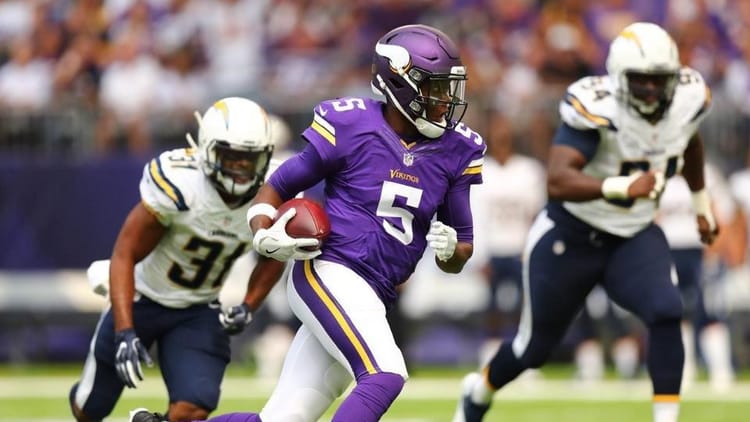Eric Sugarman: “We Expect Teddy to Make a Full Recovery”

Time seemed to slow down when Teddy Bridgewater crumpled to the ground this afternoon. The Minnesota Vikings watched and waited as their quarterback was taken from Winter Park and rushed to Hennepin County Medical Center.
Nearly two hours after the incident, head coach Mike Zimmer took to the podium, labeling his Bridgewater’s injury as “significant” and casting doubt on his playing prospects this season. Although Zimmer couldn’t elaborate on the extent of the injury at the time, we now know exactly what happened when Bridgewater fell to the turf.
Vikings Director of Sports Medicine and Head Athletic Trainer Eric Sugarman released a statement this evening, explaining in detail the extent of Bridgewater’s injury:
[quote_box_center]Teddy Bridgewater suffered a non-contact injury today at practice. The injury was quickly identified as a dislocated knee. The injury was stabilized, and he was transported to a nearby hospital for treatment and evaluation. After undergoing an MRI, it was determined that Teddy suffered a complete tear to his ACL and other structural damage. Fortunately, there appears to be no nerve or arterial damage. Surgical repair will be scheduled within the next few days. Although the recovery time will be significant, we expect Teddy to make a full recovery. I would like to thank all of the medical professionals and our athletic training staff for all of their help today. Teddy has already displayed the attitude needed to overcome this injury and attack his rehab.[/quote_box_center]
Tonight’s news should elicit a sigh of relief from Vikings fans. Initial reports painted a picture of pure horror, with first-hand accounts of players vomiting on the field, cursing, and throwing their helmets. The fear, given details emerging from Winter Park, was that Bridgewater had suffered an injury similar to that of Marcus Lattimore.
Late in the 2012 college season, Lattimore played the last game of his ‘professional’ football career. He tore three ligaments in his right knee and dislocated his kneecap — an injury that prompted his teammates and opponents to gather around Lattimore in prayer. The San Francisco 49ers took a chance on Lattimore in the fourth round of the 2013 NFL Draft, but the former South Carolina running back never recovered and was forced to retire in 2014.
Bridgewater’s injury, while similar in nature, isn’t expected to end his career. A 2010 study from the Journal of Musculoskeletal Research notes that anterior dislocations (ACL tear) are most common, making up 40 percent of all knee dislocations. The study also found that low-velocity trauma, such as sports injury, contributes to less than 30 percent of cases of knee dislocation.
This designation, which Sugarman labeled ‘non-contact’ in the context of Bridgewater’s injury, has a better prognosis than dislocations suffered in high-impact incidents such as car crashes. Low-velocity dislocations result in fewer vascular (blood vessel) injuries, lesser meniscal (meniscus) damage, and fewer osteochondral (articular cartilage) fractures.
Fortunately, Bridgewater’s injuries did not include damage to the nerves or blood vessels in his knee. Jene Bramel, a pediatrician and high school football team physician, speculated that “other structural damage” could include tears to Bridgewater’s PCL, LCL or MCL ligaments. A simple ACL tear — the same injury Adrian Peterson returned from in 2012 — usually requires 8-9 months of recovery.
If Bridgewater did in fact tear multiple ligaments, he’s looking at nine or more months in Sugarman’s training room. Sugarman himself said the recovery time would be “significant,” but the team’s quick response to stabilize the knee and Bridgewater’s positive attitude moving forward give hope that Teddy will play again for the Vikings — just not in 2016.
